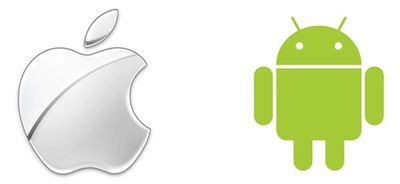Apple Proposing Settlements in Android Device Patent Disputes, Would Reap $5-15 Per Android Device
Dow Jones Newswires reports that Apple has expressed a willingness to settle some of its patent disputes with manufacturers of Android-based handsets such as Samsung and Motorola, potentially seeking to reduce the burden of ongoing litigation.
The consumer-electronics company has put forth proposals to Motorola Mobility Holdings Inc. (MMI) and Samsung Electronics Co. (005930.SE, SSNHY) to settle some pending litigation in exchange for royalty payments to license its patents, among other terms, [people familiar with the matter] said.
This is not a new tactic; Apple had some discussions with companies such as Samsung before initiating litigation, according to statements made to a court in at least one suit.

But Samsung and Motorola are not likely to be willing to agree to such settlements at face value, with Apple reportedly proposing that its competitors pay a $5-15 licensing fee to Apple for each Android handset sold.
Apple, of Cupertino, Calif., has asked for between $5 and $15 per handset for some of its patents in one negotiation, or roughly 1% to 2.5% of net sales per device, another person familiar with the matter said. Motorola, for its part, has been criticized for asking for 2.5% of net sales per device for its wireless patents from Apple.
The report notes that any settlements would appear to go against Steve Jobs' desires, as he expressed in his biography that he wished "destroy Android" even if it required "every penny" of Apple's cash hoard. Apple's cash position and domination of mobile phone industry revenues also mean that the company has less of a need to settle for royalty payments from its competitors.
Apple's competitors are of course pursuing their own actions against the company, which each side hoping to use leverage from their lawsuits to gain more favorable terms in any settlement talks.
Popular Stories
Since the iPhone X in 2017, all of Apple's highest-end iPhone models have featured either stainless steel or titanium frames, but it has now been rumored that this design decision will be coming to an end with the iPhone 17 Pro models later this year.
In a post on Chinese social media platform Weibo today, the account Instant Digital said that the iPhone 17 Pro models will have an aluminum...
Apple should unveil the iPhone 17 series in September, and there might be one bigger difference between the Pro and Pro Max models this year.
As always, the Pro Max model will be larger than the Pro model:iPhone 17 Pro: 6.3-inch display
iPhone 17 Pro Max: 6.9-inch displayGiven the Pro Max is physically larger than the Pro, it has more internal space, allowing for a larger battery and...
Apple is continuing to refine and update iOS 26, and beta three features smaller changes than we saw in beta 2, plus further tweaks to the Liquid Glass design. Apple is gearing up for the next phase of beta testing, and the company has promised that a public beta is set to come out in July.
Transparency
In some apps like Apple Music, Podcasts, and the App Store, Apple has toned down the...
The calendar has turned to July, meaning that 2025 is now more than half over. And while the summer months are often quiet for Apple, the company still has more than a dozen products coming later this year, according to rumors.
Below, we have outlined at least 15 new Apple products that are expected to launch later this year, along with key rumored features for each.
iPhone 17 Series
iPho...
In 2020, Apple added a digital car key feature to its Wallet app, allowing users to lock, unlock, and start a compatible vehicle with an iPhone or Apple Watch. The feature is currently offered by select automakers, including Audi, BMW, Hyundai, Kia, Genesis, Mercedes-Benz, Volvo, and a handful of others, and it is set to expand further.
Apple has a web page with a list of vehicle models that ...
Apple's next-generation iPhone 17 Pro and iPhone 17 Pro Max are just over two months away, and there are plenty of rumors about the devices.
Below, we recap key changes rumored for the iPhone 17 Pro models.
Latest Rumors
These rumors surfaced in June and July:Apple logo repositioned: Apple's logo may have a lower position on the back of the iPhone 17 Pro models, compared to previous...
New renders today provide the best look yet relocated Apple logo and redesigned MagSafe magnet array of the iPhone 17 Pro and iPhone 17 Pro Max.
Image via Majin Bu.
Several of the design changes coming to the iPhone 17 Pro model have been rumored for some time, such as the elongated camera bump that spans the full width of the device, with the LiDAR Scanner and flash moving to the right side.
...
iPhone 17 models will feature a redesigned Dynamic Island user interface, according to a post today from Digital Chat Station, an account with more than three million followers on Chinese social media platform Weibo. The account has accurately leaked some information regarding future Apple products in the past.
The account did not share any specific details about the alleged changes that are ...





















